Looking back at global dis:connect’s first annual conference, 20-21 october 2022 (by hanni geiger & tom menger)
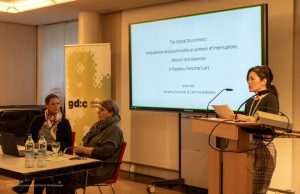
@Annalena Labrenz & David Grillenberger
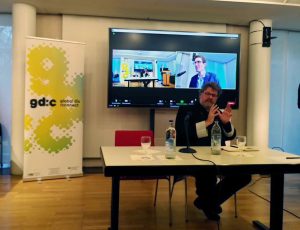
@Ben Kamis

@Annalena Labrenz & David Grillenberger

@Ben Kamis
Image 1: In lieu of the audience: the gaze of the touch-spectreOur performance workshop started from the premise of ‘give and take’ in the global dynamics of social and economic exchange to investigate the notion of ‘dis:connect’ from a phenomenological perspective. By emphasising sensual touch in the encounter with personal objects, we sought to abstract from the visual and intellectual engagement that is often the focus of such transaction in other contexts. The debates on the restitution of art objects from the Global South to their countries of origin was also at the back of our minds, yet we did not want to make this our direct and obvious starting point. Rather, we sought to address some of those issues at a micro-level of interhuman exchange and communication. Our shared interest in objects and hands also arose from a common background in yoga, meditation and somatic practice. We both wondered about how such practices affect communication and how we cope with the global intersections of contemporary crises, as the wider consequence of the many so-called darker sides of global modernity and racial colonial capitalism. Our initial conversations started over socially distanced walks and coffees in the Englischer Garten. Susanne Schütte-Steinig soon showed me a sketch of two wooden boxes facing each other closely resembling a basic puppet theatre. Except that in this case, the puppeteers use their own hands only, whilst their bodies are held in upright stillness, resting their chin on a soft foam pad, legs shoulder-width apart in a relaxed posture, with their pubic bone just underneath the open window facing their partner on the opposite side (Image 1, 2 and 4).[1]
Image 2: The somatic “box set”That sketch ended up depicting the position held by our workshop participants for several heartbeats a couple of months later, half-way through my research fellowship. And whilst each participant centred their hands on their chest, focusing their attention inwards before offering their object for exchange, I wondered about the shadows of globalisation in that empty space (Image 4).
Image 3: A sprocket cassette from TaiwanInterviews are a common method in various types of research, including oral histories, anthropology and history. They are also a common feature of the TV and social-media world, and many of us will have sweated through an interview as the final hurdle to getting their dream job. However, our artistic workshop was not particularly interested in any of these interview techniques and formats. Rather, the focus was to be solely directed towards the object itself, as well as the gestures of the hands holding it. The objects were therefore initially chosen by each participant with the following instruction:
Hand on your heart, are you ready to give your object?Disconnected from our everyday working environment, the invitation to Susanne’s Atelier in Munich’s Baumstraße offered the researchers an opportunity for a performative encounter with each other and our objects in a different setting. The day was sunny and two more members of global dis:connect were able to join us, as they had recovered from a Covid-19 infection the previous week. In their cases, we had no accompanying interview to go with but only their yoga of hands. Not unlike the European Enlightenment, yoga practice has also journeyed across the globe into our living rooms and local gyms. Yet, as a practice it predates the European Enlightenment by centuries and perhaps is the more sophisticated for it. Although many people around the world practice yoga and meditation these days, there is still a tendency to consider these spiritual and physical activities separate – as separate as is the body from the mind, even now, for some of us brought up in a false sense of neutral objectivity grounded in notions of Enlightenment philosophy and the split that was supposedly created there. In this second part of the workshop, it was our chance to break with the Enlightenment conventions of European research and bring these disconnected spheres of research and artistic practice together. With the help of the artist’s skill to re-connect the disconnected through her theatrical set-up, we hoped to shed some light on the shadow aspects of global exchange practices in other realms. And as each participant entered Susanne’s installation, they found themselves no longer able to hide behind elaborate words or even in a photographic representation of themselves as in aesthetic realism, because all but their hands touching was withheld from their own view. In this vulnerable moment, the hands started talking their own language, as they were led by the energy of the individual heartbeat.
The Yoga of Hands and the Space In-Between
Just as the perceived world endures only through the reflections, shadows, levels, and horizons between things (which are not things and are not nothing, but on the contrary mark out by themselves the fields of possible variation in the same thing and the same world), so the works and thoughts of a philosopher are also made of certain articulations between things said.[3]These ‘certain articulations between things said’ are now captured in the yoga of hands and the silent negotiation that takes place in the in-between encounter of Susanne’s edited film of this performative installation in two parts. Deprived of their elaborate wordings, the researchers in this project opened themselves to become vulnerable to the essence of touch. This in-between space holds, for me, the colon in the conceptual idea of the centre’s name: ‘Dis:connect’ then offers an opportunity to account for the shadow aspect of that absence, which is only made visible by all that is not seen much less explained, but merely felt in an instance of touch. [1] There is no audience in the conventional sense, only the camera (alias ‘The Touch-Spectre’), which zooms in on the exchange of hands and the space in/between. No one claps, the beginning and end are decided by the two participants only and guided by Susanne’s movement instructions and action score. [2] Achille Mbembe addresses this point in several of his works and the term ‘sources of life’ reflects on the energetic and creative essentials of living that have been sacrificed to the necropolitical project of Western colonial modernity whilst they remain a constant source also for the rebuilding of new African subjectivities. [3] Maurice Merleau-Ponty, Signs (Chicago: Northwestern University Press, 1964), 160.
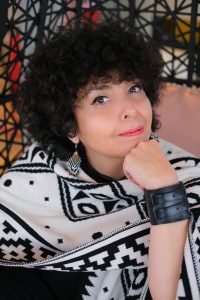
Yolanda Gutiérrez
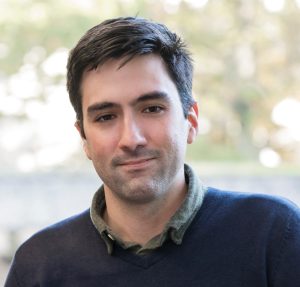
Lachlan Fleetwood
Lachlan Fleetwood is historian of science, empire, geography and the environment. He completed a PhD at Cambridge and subsequently held fellowships at University College Dublin and Yale. He comes to LMU as a Marie Skłodowska-Curie fellow. His work focuses on the uneven imposition of ostensibly global environmental categories by empires in the long nineteenth century. His research also investigates how geographical features like mountains and deserts can serve as scales for new global histories of science, empire and labour. His first book, Science on the Roof of the World: Empire and the Remaking of the Himalaya, was published by Cambridge University Press in 2022.
At global dis:connect, Lachlan is completing a project titled Imperial science and the habitability of Central Asia and Mesopotamia, 1815-1914: a history of the societal consequences of changing limits. This history of environmental sciences examines ideas of habitability, uninhabitability and climatic determinism in relation to empire, and it traces their postcolonial legacies in the age of climate crisis.
Continue Reading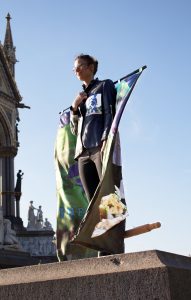 A warm welcome to our new fellow Franziska Windolf who recently joined global dis:connect.
A warm welcome to our new fellow Franziska Windolf who recently joined global dis:connect.
Franziska Windolf is a visual artist currently exploring the performative potential of patchwork. She deconstructs the patchwork into ‘patch’ and ‘work’, understanding these terms as fragments and action in public or gallery spaces. For her, the artwork is a catalyst, a method of investigation, a means of connecting to people and a way to explore exile and commemoration. By contesting prevalent relationships and hierarchies, and by reassembling research findings, Franziska conceives the artwork as inconsistent, absurd and yet within reach.
While at global dis:connect, Franziska is working with diverse portable sculptures, whose forms emerge through encounters in public spaces. She creates an imaginary space of remembrance and reflection in which fragmented memories of exiled artists in the city as well as history of Munich find a poetic presence. Continue Reading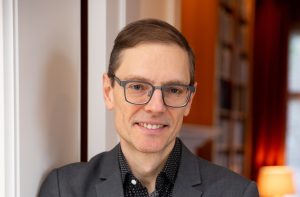 A warm welcome to our new guest Martin Puchner who joins the Kolleg until late spring 2023.
Martin Puchner has worked on such disparate topics as modernist closet dramas, revolutionary manifestos, Platonic dialogues, a history of world literature, environmental storytelling and Rotwelsch, the secret language of Central Europe. Having studied at the universities of Konstanz and Bologna, he pursued these topics at Columbia and Harvard, with shorter stints at Cornell, the Berlin Institute for Advanced Study, the New York Public Library and the American Academy. He occasionally attempts to bring the humanities to the attention of a larger public with op-eds, book reviews, essays, anthologies and open online courses.
At global dis:connect, Martin will expand his forthcoming history of culture, entitled Culture: the story of us, from cave art to K-pop, into a textbook introduction to the arts and humanities. The work focuses on mechanisms of transmission, with particular emphasis on interruption, misreading, appropriation and — of course — global dis:connections.
Continue Reading
A warm welcome to our new guest Martin Puchner who joins the Kolleg until late spring 2023.
Martin Puchner has worked on such disparate topics as modernist closet dramas, revolutionary manifestos, Platonic dialogues, a history of world literature, environmental storytelling and Rotwelsch, the secret language of Central Europe. Having studied at the universities of Konstanz and Bologna, he pursued these topics at Columbia and Harvard, with shorter stints at Cornell, the Berlin Institute for Advanced Study, the New York Public Library and the American Academy. He occasionally attempts to bring the humanities to the attention of a larger public with op-eds, book reviews, essays, anthologies and open online courses.
At global dis:connect, Martin will expand his forthcoming history of culture, entitled Culture: the story of us, from cave art to K-pop, into a textbook introduction to the arts and humanities. The work focuses on mechanisms of transmission, with particular emphasis on interruption, misreading, appropriation and — of course — global dis:connections.
Continue Reading
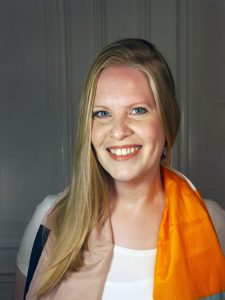 A warm welcome to our new fellow Anna Grasskamp who joins the Kolleg until late summer 2023.
Anna Grasskamp is a lecturer in art history at the University of St Andrews. She has authored Art and Ocean Objects of Early Modern Eurasia. Shells, Bodies, and Materiality (Amsterdam University Press, 2021) and Objects in Frames: Displaying Foreign Collectibles in Early Modern China and Europe (Reimer, 2019). Her articles have appeared in Res: Anthropology and Aesthetics, Renaissance Studies and other journals. Anna is a subject editor at the review journal SEHEPUNKTE and a member of the editorial boards of the book series Global Epistemics and the Journal for the History of Knowledge.
Project:
Trash as treasure: value disconnections and the recycling of Chinese matter in art and design, 1500–2020
Recycling materials ‘made in China’ has a short history in the daily practices of middle-class households, but a long history in global art and design. Chinese natural resources, such as rare-earth metals used in digital devices and commodities like porcelain made of Chinese clay, have been pivotal to material, technological and artistic exchanges between Europe and Asia since early modernity. This project investigates art and design as fields of pioneering research in which strategies to reuse Chinese matter were developed centuries before the term ‘recycling’ – as we use it today – was adopted. It researches material flows of garbage in relation to disrupted material value systems associated with trash. Disruptions take place across cultural boundaries that allow for radical changes in systems of material evaluation (e.g. enabling the perception of ‘trash as treasure’) and through transcultural artistic research, which reuses and re-evaluates seemingly ‘meaningless’ garbage by turning it into multi-million-dollar art installations and prized design innovations. The project offers a non-hegemonic history of art and design, which researches urban hubs and rural ecologies, the works of artists and artisans, as well as the products of craftsmen and factory workers across social, historic and cultural divides.
Continue Reading
A warm welcome to our new fellow Anna Grasskamp who joins the Kolleg until late summer 2023.
Anna Grasskamp is a lecturer in art history at the University of St Andrews. She has authored Art and Ocean Objects of Early Modern Eurasia. Shells, Bodies, and Materiality (Amsterdam University Press, 2021) and Objects in Frames: Displaying Foreign Collectibles in Early Modern China and Europe (Reimer, 2019). Her articles have appeared in Res: Anthropology and Aesthetics, Renaissance Studies and other journals. Anna is a subject editor at the review journal SEHEPUNKTE and a member of the editorial boards of the book series Global Epistemics and the Journal for the History of Knowledge.
Project:
Trash as treasure: value disconnections and the recycling of Chinese matter in art and design, 1500–2020
Recycling materials ‘made in China’ has a short history in the daily practices of middle-class households, but a long history in global art and design. Chinese natural resources, such as rare-earth metals used in digital devices and commodities like porcelain made of Chinese clay, have been pivotal to material, technological and artistic exchanges between Europe and Asia since early modernity. This project investigates art and design as fields of pioneering research in which strategies to reuse Chinese matter were developed centuries before the term ‘recycling’ – as we use it today – was adopted. It researches material flows of garbage in relation to disrupted material value systems associated with trash. Disruptions take place across cultural boundaries that allow for radical changes in systems of material evaluation (e.g. enabling the perception of ‘trash as treasure’) and through transcultural artistic research, which reuses and re-evaluates seemingly ‘meaningless’ garbage by turning it into multi-million-dollar art installations and prized design innovations. The project offers a non-hegemonic history of art and design, which researches urban hubs and rural ecologies, the works of artists and artisans, as well as the products of craftsmen and factory workers across social, historic and cultural divides.
Continue Reading
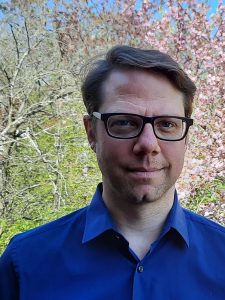 A warm welcome to our new fellow Martin Rempe who joins the Kolleg until autumn.
A warm welcome to our new fellow Martin Rempe who joins the Kolleg until autumn.
 A warm welcome to our new fellow Enis Maci who just joined the Kolleg for two fellow stints, one in winter/spring and one in summer 2022.
A warm welcome to our new fellow Enis Maci who just joined the Kolleg for two fellow stints, one in winter/spring and one in summer 2022.
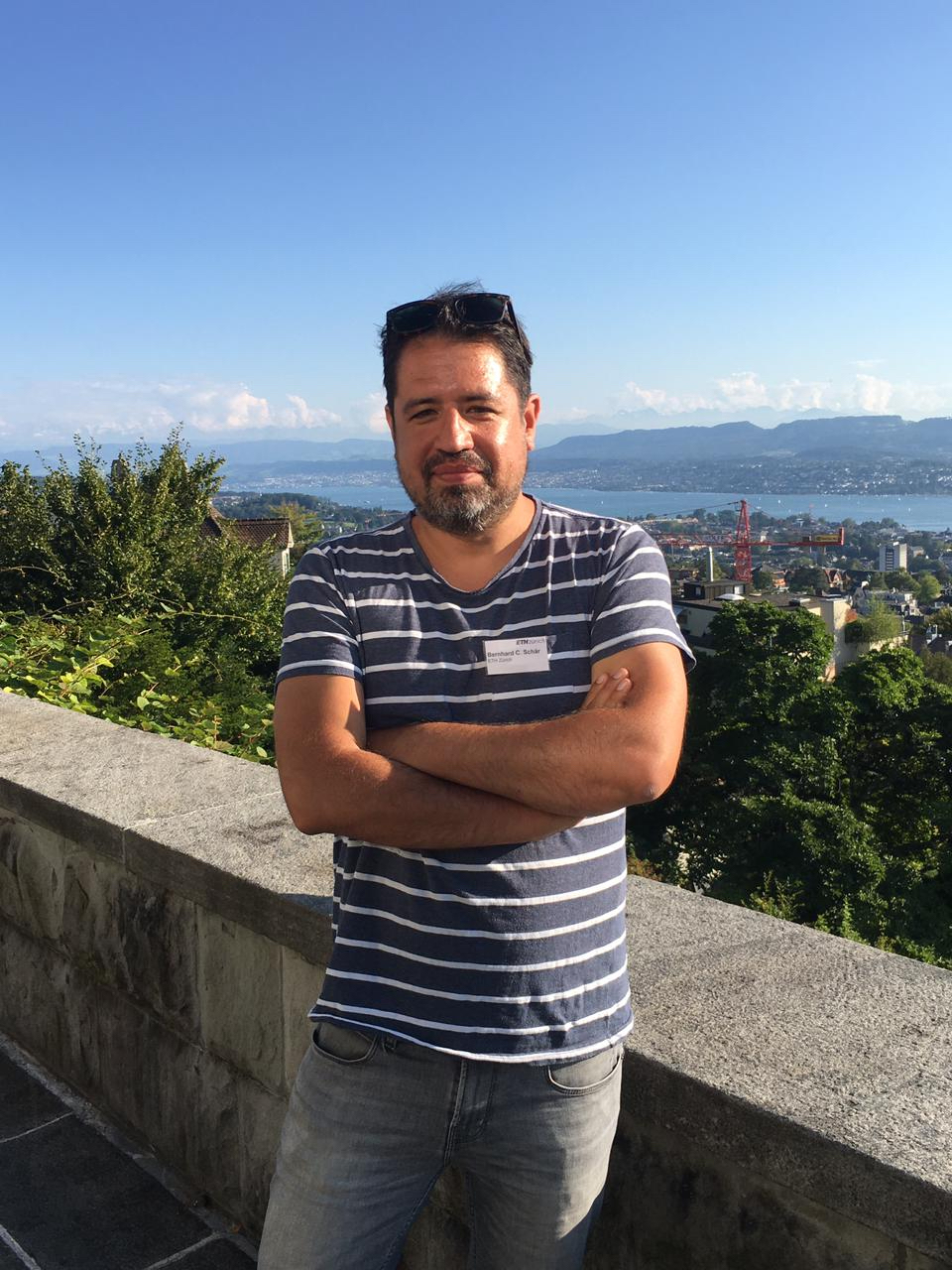 We are very happy to report that today, global historian Bernhard Schär (formerly ETH Zurich) joins our Kolleg as Marie Skłodowska-Curie Fellow. Bernhard is working on a project entitled: „European Mercenaries in the Dutch Empire. A connected History of Imperial Europe and Colonial Indonesia, c. 1800-1900“. You can learn more about the project here: https://cordis.europa.eu/project/id/101022315
Continue Reading
We are very happy to report that today, global historian Bernhard Schär (formerly ETH Zurich) joins our Kolleg as Marie Skłodowska-Curie Fellow. Bernhard is working on a project entitled: „European Mercenaries in the Dutch Empire. A connected History of Imperial Europe and Colonial Indonesia, c. 1800-1900“. You can learn more about the project here: https://cordis.europa.eu/project/id/101022315
Continue Reading